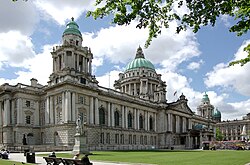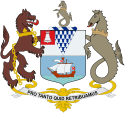Belfast City Council
|
Belfast City Council Comhairle Cathrach Bhéal Feirste Bilfawst Citie Cooncil |
|
|---|---|
| Type | |
| Type | |
| Leadership | |
| Structure | |
| Seats | 60 |
 |
|
|
Political groups
|
Sinn Féin (19) DUP (13) Alliance (8) SDLP (7) UUP (6) PUP (3) Green (NI) (1) People Before Profit (1) TUV (1) Independent Unionist (1) |
| Elections | |
|
Last election
|
22 May 2014 |
| Meeting place | |
 Belfast City Hall Belfast City Hall
|
|
| Website | |
| www |
|
| Lord Mayor of Belfast | |
|---|---|

|
|
| Style | The Right Honourable |
| Appointer | Belfast City Council |
| Term length | One year |
| Inaugural holder | Sir Daniel Dixon |
| Formation | 1892 |
| Deputy | Mary Ellen Campbell |
Belfast City Council (Irish: Comhairle Cathrach Bhéal Feirste; Ulster-Scots: Bilfawst Citie Cooncil) is the local authority with responsibility for part of the city of Belfast, the capital and largest city of Northern Ireland. The Council serves an estimated population of 333,871 (2011), the largest of any district council in Northern Ireland, while also being the fourth smallest by area. Belfast City Council is the primary council of the Belfast Metropolitan Area, a grouping of six district councils with commuter towns and overspill from Belfast, containing a total population of 579,276.
The Council is made up of 60 councillors, elected from nine district electoral areas across the city, most representing the more heavily populated north and west. It holds its meetings in the historic Belfast City Hall. The current Lord Mayor is Brian Kingston of the Democratic Unionist Party.
As part of the 2014/2015 reform of local government the city council area expanded and now covers an area that includes 53,000 additional residents in 21,000 households. The number of councillors increased from 51 to 60. Elections to the expanded city council took place on 22 May 2014.
Belfast's modern history can be dated back to the Plantation of Ulster in the early 17th century which brought significant numbers of Protestant Scottish and English settlers to Ulster. The town gradually developed to become a major industrial centre, in particular in the areas of linen and ship building. In recognition of this growth Belfast was granted city status in 1888 and by 1901, it was the largest city in Ireland. The city's importance was evidenced by the construction of the lavish City Hall, completed in 1906.
...
Wikipedia


